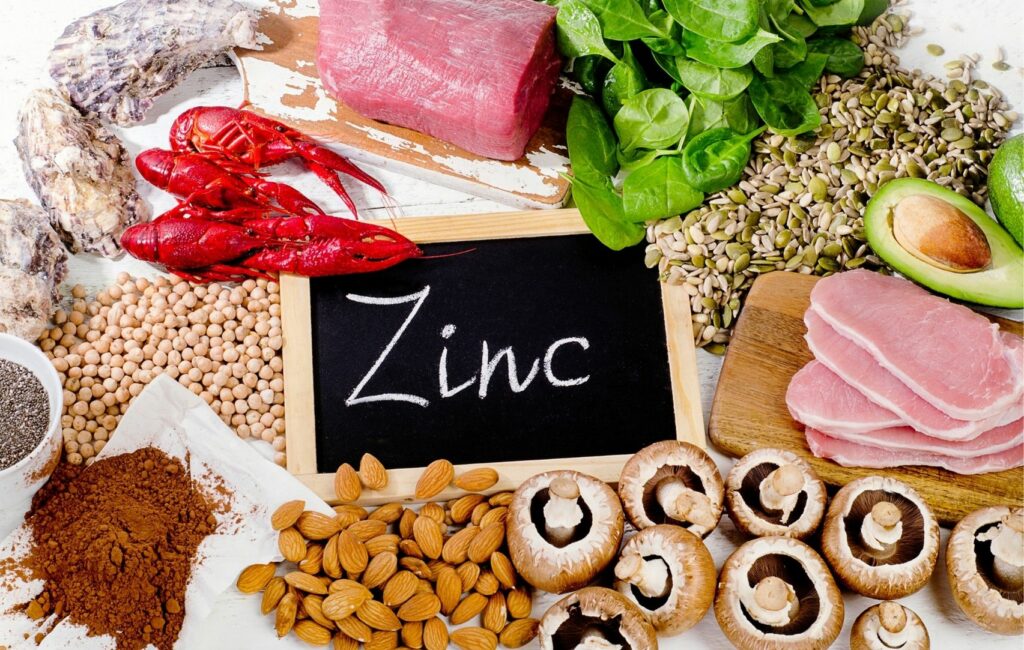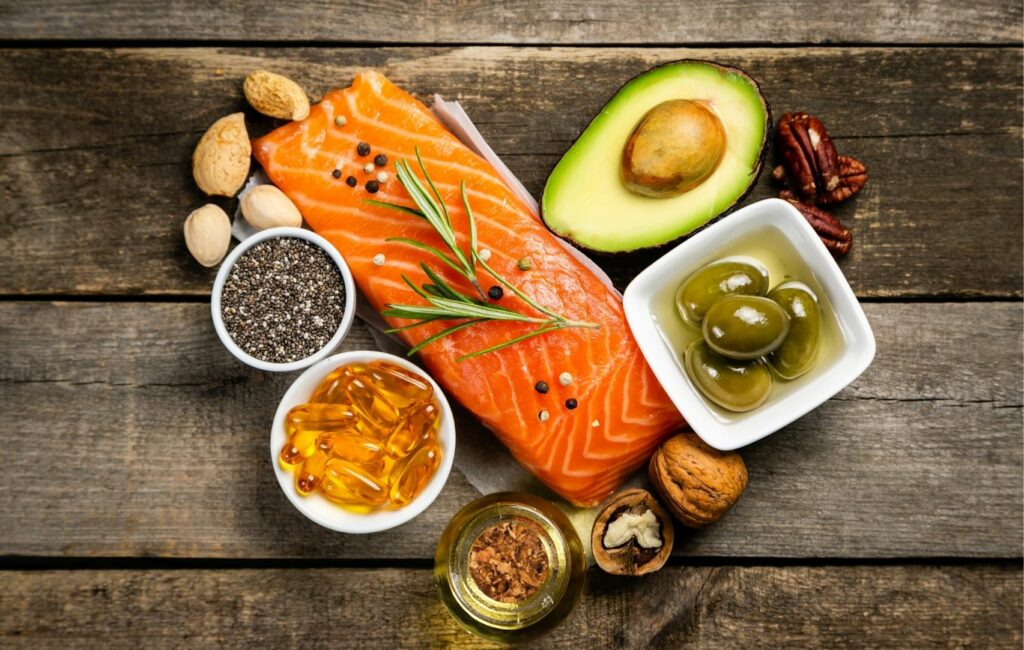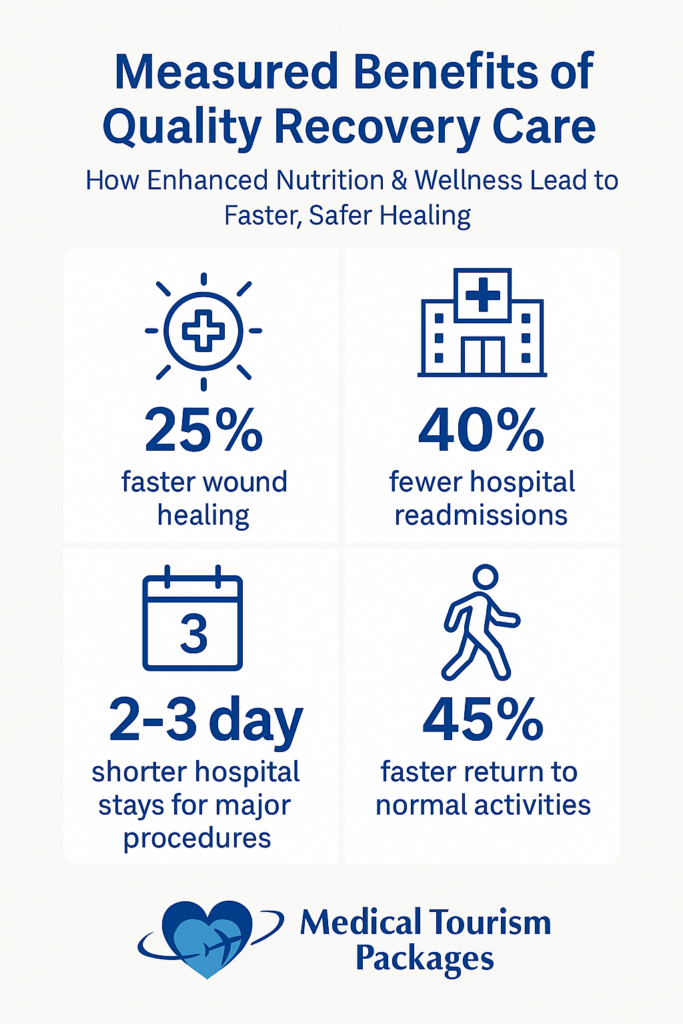Book Appointment Now
Fill the form below to customize your package

Recovery from surgery, illness, or injury requires complete body support. Good nutrition and wellness practices speed up healing and improve patient comfort. This article explains how specialized nutrition and wellness services help patients recover faster with fewer complications, whether at home or through international medical tourism options.
Today’s patients have multiple options for accessing comprehensive recovery care. From specialized facilities in their local communities to international medical tourism destinations in countries like Colombia, Costa Rica, and Panama, the focus on nutrition and wellness as components of recovery continues to grow.
Quality recovery care provides more than basic medical treatment. It offers complete support for the entire healing process. This comprehensive approach addresses nutritional needs, physical rehabilitation, emotional well-being, and comfort during recovery.
Quality care recognizes that healing involves the whole body, not just the treated area. It brings together teams of specialists who focus on different aspects of recovery. Nutritionists create personalized meal plans. Physical therapists develop safe movement programs. Wellness specialists teach stress management techniques that support healing.
Unlike standard care that focuses mainly on medical treatment, quality recovery care takes a proactive approach to prevent complications and speed healing. Patients receive ongoing assessment and personalized adjustments to their care plan. This attention to detail helps patients regain strength faster and return to normal activities sooner. Many leading medical centers now offer these comprehensive recovery programs, recognizing their value in improving outcomes and patient satisfaction.
Standard Care vs. Quality Recovery Care:
| Aspect | Standard Care | Quality Recovery Care |
|---|---|---|
| Nutrition Planning | General guidelines | Personalized nutrition plans based on individual needs |
| Provider Expertise | General nursing staff | Certified specialists in recovery nutrition |
| Meal Options | Standard hospital menu | Custom-prepared meals for healing |
| Wellness Services | Basic physical therapy | Integrated stress reduction and targeted movement therapy |
| Recovery Environment | Shared hospital spaces | Private recovery areas designed for comfort |
| Monitoring | Routine vital checks | Continuous assessment and plan adjustments |
According to the Joint Commission International (JCI), top recovery facilities provide personalized attention and services that create an ideal healing environment.
Research shows nutrition affects recovery in three main ways:
Let’s examine each of these critical functions in detail:
The body needs specific nutrients to rebuild damaged tissues. Research in the Journal of the American College of Surgeons shows these key nutrients support tissue repair:

In quality care settings like Massachusetts General Hospital, nutritionists check what nutrients each patient needs based on their surgery type and body requirements.
Good nutrition boosts immune function during healing. Research from Harvard T.H. Chan School of Public Health shows:
Immunity-Boosting Nutrients:
| Nutrient | Function | Benefit | Food Sources |
|---|---|---|---|
| Vitamin D | Reduces inflammation | Lowers post-surgical problems by up to 20% | Fatty fish, fortified dairy, sunshine |
| Omega-3 fats | Resolves inflammation | Promotes healing through specialized mediators | Salmon, walnuts, flaxseeds |
| Antioxidants | Protects tissues | Prevents damage from oxidative stress | Berries, dark chocolate, green tea |
| Glutamine | Fuels immune cells | Supports white blood cell function | Protein foods, supplements during recovery |
Quality recovery programs include meals rich in these immune-supporting nutrients. Some international recovery centers, particularly in Latin America, incorporate locally-sourced, nutrient-dense foods into their healing meal plans.

Healing requires extra energy. The body needs 20-50% more energy during recovery, depending on the procedure or illness. Johns Hopkins Medicine research shows three key factors affect energy during recovery:
Quality care centers like NYU Langone Medical Center test each patient’s metabolism to determine exact calorie and nutrient needs.
Quality recovery programs combine nutrition with proven wellness practices.
Research from the National Institutes of Health shows stress slows wound healing by increasing cortisol and inflammation. Quality facilities offer these evidence-based techniques:
Stress Reduction Methods and Benefits:
| Technique | Physiological Benefit | Recovery Impact |
|---|---|---|
| Guided meditation | Reduces inflammation markers by up to 15% | Improves tissue healing conditions |
| Biofeedback | Helps patients control stress response | Enhances blood flow to healing areas |
| Therapeutic massage | Releases muscle tension | Improves circulation to damaged tissues |
| Deep breathing | Activates parasympathetic nervous system | Optimizes cellular oxygen delivery |
At UCSF Medical Center’s Integrative Health Programs, these practices are prescribed like medicine, with plans made for each patient’s needs.

Appropriate movement helps recovery. Studies in Physical Therapy journal show these benefits:
Quality programs include physical therapists who specialize in post-surgery rehabilitation.
Quality recovery programs offer several key services:
Unlike standard care’s one-size-fits-all approach, quality programs begin with complete testing:
Comprehensive Assessment Components:
| Assessment Type | What It Measures | How It Guides Care |
|---|---|---|
| Metabolism testing | Calorie needs | Prevents malnutrition or excess weight gain |
| Nutrient analysis | Vitamin and mineral status | Identifies specific deficiencies to correct |
| Food sensitivity testing | Inflammatory triggers | Eliminates foods that might slow healing |
| Body composition scanning | Muscle and fat ratios | Establishes baselines and recovery goals |
Dr. Frank Hu of Harvard School of Public Health explains: “Personal nutrition matters most during recovery when the body has special needs.”
Quality recovery programs like those at Memorial Sloan Kettering Cancer Center include these specialized meal features:
These meals meet nutritional needs while tasting good, which helps patients who have poor appetite during recovery.
Recovery needs change as healing progresses. Quality programs provide ongoing care adjustments:
Monitoring Schedule and Adjustments:
| Recovery Phase | Monitoring Frequency | Typical Adjustments |
|---|---|---|
| Immediate post-procedure | Daily assessment | Inflammation control, protein increase |
| Early recovery (1-2 weeks) | 2-3 times weekly | Calorie adjustment, supplement modification |
| Mid recovery (2-6 weeks) | Weekly | Activity-based nutrition changes |
| Late recovery (6+ weeks) | Bi-weekly | Transition to maintenance nutrition |
This active approach ensures nutrition support stays optimal throughout recovery.
Research shows quality nutrition and wellness services provide clear benefits:

A review in the American Journal of Clinical Nutrition found patients receiving optimal nutrition experienced these improvements:
These results improve patient experience and save healthcare costs.
Stanford Medicine research shows patients in complete nutrition and wellness programs have reduced complication rates:
Complication Reduction with Quality Care:
| Complication Type | Reduction Rate | Impact on Recovery |
|---|---|---|
| Surgical site infections | 30% fewer | Prevents extended antibiotic use |
| Hospital-acquired pneumonia | 40% fewer | Avoids respiratory setbacks |
| Post-surgical nausea | Significant decrease | Improves nutrition intake |
| Blood sugar control issues | Lower rates | Supports consistent healing |
These benefits help complex cases and vulnerable patients like older adults.
Studies in the British Journal of Surgery show quality recovery care leads to:
These benefits extend beyond immediate recovery and support long-term health.
Despite the benefits, several barriers limit access to quality nutrition and wellness services:
Most health insurance plans restrict coverage for specialized nutrition and wellness:
Insurance Coverage Challenges:
| Service | Typical Coverage | Out-of-Pocket Cost Range |
|---|---|---|
| Nutritionist visits | Limited to 2-3 sessions | $100-200 per session |
| Specialized meals | Rarely covered | $30-75 per day |
| Wellness services | Often excluded | $50-150 per session |
| Supplements | Almost never covered | $100-300 per month |
The American Society for Parenteral and Enteral Nutrition (ASPEN) identifies these coverage gaps as major barriers to complete recovery programs.
Quality recovery services are not available everywhere:
These differences mean patients sometimes need to travel far for quality recovery care, with some patients exploring international medical tourism options to access specialized services.
Despite challenges, patients can use several strategies to get quality recovery care locally:
Patients can work with their healthcare providers to improve coverage through these methods:
Many facilities also offer package deals that cost less than individual services.
Telemedicine has expanded access to specialized services through these options:
Telehealth Recovery Support Options:
| Service Type | Benefits | How to Access |
|---|---|---|
| Remote dietitian consultations | Specialized expertise without travel | Academy of Nutrition and Dietetics referral service |
| Virtual wellness programs | Follow from home, schedule flexibility | Hospital outpatient departments |
| Digital monitoring tools | Connect with care teams between visits | Health system patient portals |
| Online support groups | Peer advice and professional moderation | Professional association websites |
The Commission on Dietetic Registration (CDR) lists certified professionals who offer telehealth for recovery support.
Many hospitals and community groups offer elements of quality recovery care:
These resources provide valuable support when used with guidance from doctors.
For patients seeking high-quality nutrition and wellness support during recovery, medical tourism has emerged as a viable option. Medical Tourism Packages specializes in connecting patients with excellent healthcare and comprehensive recovery support in Colombia, Costa Rica, and Panama at competitive prices.
/image
These three countries offer distinct advantages for patients seeking premium recovery care:
Premium Recovery Facilities in Latin America:
| Country | Nutritional Strengths | Wellness Integration | Recovery Environment |
|---|---|---|---|
| Colombia | Farm-to-table recovery meals, personalized nutrition plans | Integration of physical therapy with nutrition programs | Private recovery suites with nature views in major cities |
| Costa Rica | Organic, locally-sourced healing foods, specialized dietary programs | Holistic wellness approach combining nutrition with natural healing | Recovery retreats in tranquil settings with therapeutic landscapes |
| Panama | International cuisine options adapted for recovery needs | Modern wellness facilities with cutting-edge therapeutic equipment | Urban recovery centers with luxury accommodations |
All three countries feature JCI-accredited hospitals that meet international standards for medical care quality and safety, with significantly lower costs than comparable services in the United States.
Medical Tourism Packages offers comprehensive service packages that address every aspect of recovery, with nutrition and wellness forming core components:
When considering medical tourism for recovery care, Medical Tourism Packages stands out as a specialized provider connecting patients with quality care in Colombia, Costa Rica, and Panama. Their services include:
Medical Tourism Packages focuses specifically on creating seamless journeys to Colombia, Costa Rica, and Panama, with nutrition and wellness support as key components of their recovery-focused experiences.
Medical tourism for recovery care works best for:
By combining high-quality medical care with nutrition and wellness support, medical tourism packages offer an alternative path to recovery that many patients find both effective and economically advantageous.
Quality recovery care goes beyond standard treatment by offering a holistic approach to healing. It includes personalized nutrition plans, wellness services like stress management and physical therapy, private recovery environments, and continuous monitoring to adjust care as needed. This integrated care helps patients recover faster, with fewer complications and better overall outcomes.
Nutrition plays a critical role in recovery by helping to build new tissue, strengthen the immune system, and provide energy for healing. Key nutrients like protein, vitamin C, zinc, omega-3 fats, and antioxidants support wound repair, reduce inflammation, and prevent complications such as infections.
Wellness practices in quality recovery care include stress reduction techniques like guided meditation, biofeedback, massage therapy, and deep breathing. These methods lower inflammation and cortisol levels, improve circulation, and support overall healing. Physical therapy and breathing exercises are also used to maintain strength and prevent complications.
Medical tourism offers access to premium recovery services—often at a lower cost than domestic care. Destinations like Colombia, Costa Rica, and Panama provide personalized nutrition plans, wellness therapies, private accommodations, and JCI-accredited medical facilities. This can be especially helpful for patients who face access or affordability challenges locally.
Premium medical tourism recovery packages usually include pre-travel planning, medical care with certified specialists, private recovery accommodations, personalized nutrition support, daily wellness services, and follow-up care. These packages are designed for optimal healing, comfort, and cost-effectiveness.
Common barriers include limited insurance coverage for nutrition and wellness services, geographic disparities in care availability, and a lack of specialized professionals in certain regions. These challenges make it harder for many patients to access comprehensive recovery care without traveling or paying out-of-pocket.
Patients can improve access to quality recovery care locally by working with their healthcare providers to document medical necessity, appeal insurance decisions, explore telehealth options, and connect with hospital-based or community wellness programs. Universities, YMCA programs, and local support centers may also offer valuable recovery services.